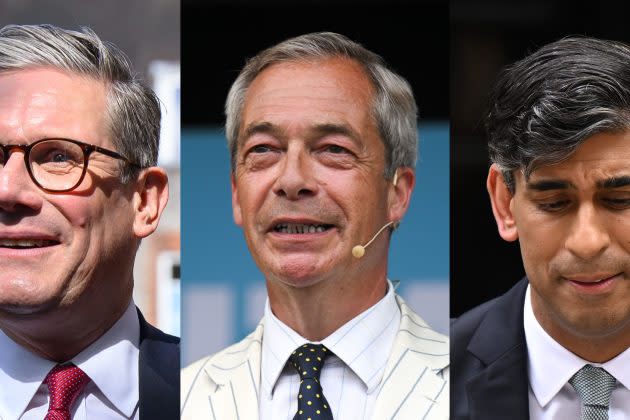UK Election Analysis: Labour’s Landslide Victory & Reform’s Right-Wing Surge Redraws The Political Map

The UK’s political map has been significantly redrawn.
After 14 years in power, the Conservative Party has been routed by Keir Starmer’s Labour, suffering heavy losses not only to their traditional enemy but also to the Liberal Democrats and the upstart right-wing Reform UK. The result has the feeling of a punishment vote as much as a ringing endorsement of Starmer.
More from Deadline
Lisa Nandy Appointed Culture Secretary Following Labour's Landslide Win In UK Election
International Insider: European Elections; Women In Film & TV; Karlovy Vary & Munich Reports
The Conservatives, the dominant power in British politics over the past 40 years, suffered the worst result in their history — losing a whopping 250 seats to leave them on only 121 (there are still a couple of results outstanding) MPs out of the 650 total.
By tacking to the centre, Labour has amassed 412 seats, a 211 improvement on 2019. This is a spectacular reversal of fortunes given where they came from. Labour’s 2019 result was the worst since 1935. Under former leader Jeremy Corbyn, the party was on the brink of armageddon.
The Conservatives have been crushed by a confluence of events, many of their own making, some beyond their control. A bruising cost-of-living crisis, pandemic and Brexit (devoid of tangible improvements to the country), the behavior of Boris Johnson, the missteps of Liz Truss, an inability to curb illegal migration, and multiple gaffes by latest Conservative leader Rishi Sunak have all played into their downfall.
Many of the leading Tories of recent years have lost seats overnight in jaw-dropping fashion. Former Prime Minister Truss — a vocal supporter of Donald Trump — is a case in point. She became the first former PM to lose their seat in more than 100 years. She saw her huge 32,988 majority overturned, resulting in a 26% swing to Labour, the biggest swing ever in a UK seat. Truss’ brief, catastrophic time in office led to a dent in Tory support from which it never recovered.
But Truss was just one of a handful of former Cabinet ministers to lose their seats. Defence Secretary Grant Shapps, Commons leader Penny Mordaunt, Justice Secretary Alex Chalk and former minister and Brexit cheerleader Sir Jacob-Rees Mogg were all kicked out by the electorate.
Beneath the stark headlines, the picture is more muddied.
This is a volatile political landscape. The UK now has its fourth prime minister in under two years. The Labour Party made major seat gains but, strangely, didn’t actually improve its volume of votes from 2019. Turnout was low. Instead, the Conservatives haemorrhaged vote share to the Liberal Democrats and the newly formed Reform UK, led by Trump ally, Brexit architect and anti-immigrant rabble-rouser Nigel Farage. Labour led a clinical and forensic campaign that expertly worked the system.
While much of Europe pivots right, the UK has on first glance chosen a different direction. Beneath the surface, the right has also surged. Farage’s right-wing agenda drew in more than four million voters, a staggering number, even if that only translated to four MPs. Reform accounted for 14% of the popular vote, the third largest among the parties. While it should be noted that UKIP performed similarly a decade ago in terms of the popular vote, Reform’s impact on the night’s results and the message from Reform voters will have a resounding impact on the future shape of the Conservative Party and potentially on the direction of Labour. Will either seek to embrace Reform’s agenda and voters? An embrace or stark rejection from either side will further redraw the UK political landscape.
A different direction
The victories for Labour and Reform also set up an intriguing dynamic between the UK and its allies. Trump was quick to herald the victory for Farage but ignored Starmer, whose history on the left doesn’t make him a natural bed-fellow of Agent Orange. The rise of Reform also raises the possibility of future right-wing axis of power between the likes of Trump, Farage and France’s surging National Rally party led by Marine Le Pen.
Another simmering issue that has further fractured the vote is that of the Israel-Gaza crisis. A number of Labour candidates either lost seats or saw their majorities diminished by the gains of Pro-Palestine independent candidates angered by Labour’s dovish approach to Israel’s war in Gaza.
In yet another sign of splintering, the night also saw huge losses for Scotland’s SNP, along with big gains for the left-wing Green Party.
The Labour Party will inherit many of the same national issues that were either caused by or dogged the Conservative party: cost of living woes, floundering public services, inflation, illegal immigration, and more. The mandate is strong today, but the ability to effect change will take time.
Much of the UK’s film and TV industries will be breathing a sigh of relief after years of exhausting culture wars. Check out our analysis here of industry priorities from the new Labour government.
Best of Deadline
'MaXXXine' Character Guide: From Lily Collins to Elizabeth Debicki
All the Surprise Songs Taylor Swift Has Played On The Eras Tour So Far
Sign up for Deadline's Newsletter. For the latest news, follow us on Facebook, Twitter, and Instagram.
